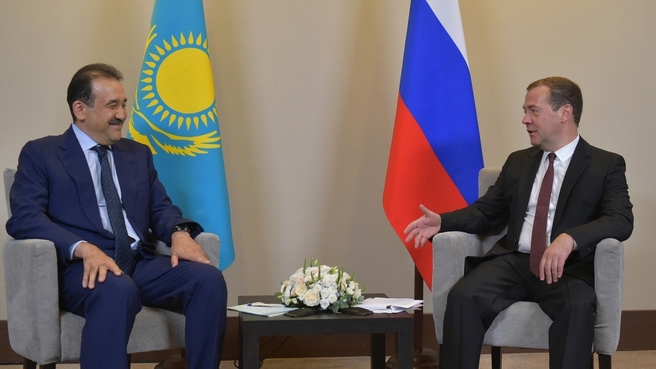Transcript of the beginning of the meeting:
Dmitry Medvedev: Mr Massimov, yesterday you and I had a very useful informal exchange of views on the current state of our economies, political developments and all issues of interest in a bilateral, as well as multilateral settings.
Today, we have an official meeting. Once again, I cordially welcome you. The relations between Russia and Kazakhstan are showing steady progress and have reached a very high level of a genuine partnership.
At the same time, there are always things to discuss, including bilateral projects. I would like to draw your attention to the fact that bilateral trade has been declining recently. We have already mentioned in our conversations that we need to make the necessary efforts in order to fill the gaps we are seeing despite the challenging economic environment. But this is certainly not the only issue we need to discuss. There are quite a few of them. I cordially welcome you to the Russian Federation and the city of Sochi.
Karim Massimov: Thank you very much, Mr Medvedev. I would like to start by thanking you for your warm and cordial hospitality.
I think it is very important that we were able to meet yesterday and go over certain issues, so that today we can focus on more practical matters regarding bilateral relations, as well as the development of relations within the Eurasian Economic Union.
Mr Medvedev, there are several questions I wanted to raise during today’s meeting. We are preparing to host the cross-border cooperation forum that will take place in October in Astana. This is a major business forum. The Government of Kazakhstan is preparing to hold this event. I believe this to be a very important matter.
Furthermore, under the President’s instructions I’ve been travelling across Kazakhstan’s regions. I’ve already visited half of them. Some of the questions that are raised during these trips are related to our bilateral relations.
One hundred years ago, in 1917, a plethora of various historic events took place. There is one question that I wanted to discuss with you in this respect, and ask you to issue instructions to get to the bottom of the issue. The remains of Keiki Batyr, one of the leaders of Kazakhstan’s national liberation movement of that time, are kept by the Peter the Great Museum of Anthropology and Ethnography of the Russian Academy of Sciences. We would very much like to find a way to return his remains to Kazakhstan and bury them there. This is a very important issue for Kazakhstan, so we turn to you with this big request, Mr Medvedev.
Dmitry Medvedev: Make no mistake, I will immediately issue instructions to this effect. We will discuss this later by telephone, and a final decision will then be taken.
Karim Massimov: Thank you very much, Mr Medvedev. Both the fact that I raised this issue with you and the way you responded are very important for us.
There were two more issues that were raised during my trips across Kazakhstan. They have to do with cross-border water supply, especially through the Ural River, and carrying out joint dredging projects. If you allow me, I would like to visit Orenburg to discuss this issue with Mr Berg [Yuri Berg, Governor of the Orenburg Region] so that we can sync up our efforts. As a matter of fact, these initiatives should be carried out simultaneously. We are ready to allocate resources and work together on this. We are looking forward to constructive joint efforts on this issue.
Dmitry Medvedev: I’m aware of this issue, and I’ve discussed it with my colleagues and heads of neighbouring regions. Let’s work on resolving it together.












